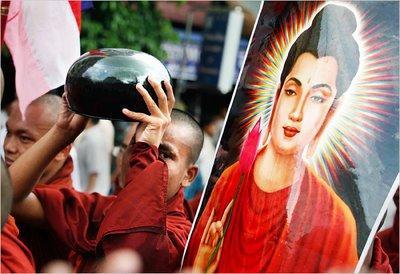TURNING OVER THE BOWL

The Buddha conceived the monastic Saïgha and the lay community as `living together in mutual dependence' (a¤¤ama¤¤aü nissaya, It.111). Monks and nuns usually took the role of teachers of the laity although sometimes this situation was reversed. The layman Citta, for example, was learned enough and skilled enough in Dhamma to teach monks who were not as learned (S.IV,282-8). The Buddha also understood that there might be times when a monk's or nun's behaviour might warrant reproof from lay people or visa versa. He said that lay people could express their disapproval of a monk or nun by refusing to give them food when they came alms gathering.
According to the commentaries, when the monks of Kosambi were locked in an unseemly squabble, the lay people decided to `neither give them salutation nor gestures of respect or offer them alms when they come to us'(Ja.III,409), which very soon brought the monks to their senses. Likewise, monks and nuns may express their disapproval of a lay person by `turning over the bowl' (pattam nikkujjeyya), i.e. refusing to accept their alms. The Buddha gave the conditions whereby monks could consider doing this, all of them concern disadvantaging the Saïgha (Vin.II,125). However, a monk may also decline to accept a lay person's alms if he knows that it has been obtained by immoral means. During the 2007 protests in Burma, many of the more aware monks refused to accept alms from the families of government officials, soldiers and senior members of the military junta.